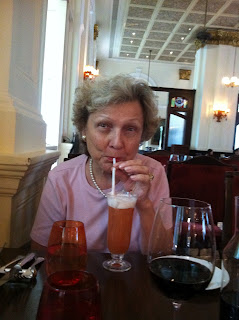In Tartu with European Human Rights Court judge Julia Laffranque when she was Julia Vahing
Increasingly one hears that it is not possible to trust
anyone in the country. Some good friends
of mine who lived here during the Soviet occupation say that back then they
knew whom to trust and whom not, but now they no longer know who can be trusted. Lack of trust has increased especially in
recent years. No doubt, part of it is
due to the economic depression which has contributed to theft and deception,
but a lot of the blame can be placed on the political leaders in Estonia.
Prime Minister Ansip has been a leading architect of the
crisis in confidence with his statements, such as his assertion that his
party’s politics will place Estonia among the five richest countries in Europe
within a certain number of years, or his remark that if this is a crisis, then
it is the very crisis with which he wants to live – this at a time when the
numbers of unemployed and people leaving the country were increasing.
The strategy followed by the Prime Minister’s Reform Party
and its allies has been divide and conquer and for its implementation the
Bolshevik principle „end justifies the means“ has been adopted. An esteemed minister even stated in an article
he wrote that human beings have not been created to serve truth, but for the
purpose of staying alive. In the
political arena that can be interpreted as staying in power. Accordingly, betrayal and mendacity are
permissible in order to remain alive or in power.
The Reform Party developed an image as the political party
with economic smarts after the country’s independence was restored which
occurred simultaneously with the period of liberal economic policies’
popularity in the market economies. They were elected into office, but in order
to remain in power - especially after the financial crash – expedient measures
were needed and being astute politicians, they knew that fear is an effective
tool.
Rather than agree to consensual transfer of the Bronze
Soldier, which had been agreed upon by the interested parties, to the new
location, the removal of the offensive Soviet era statue by the Reform Party
coalition government was used to stir fear, resulting in violence. The question
remains: why did the event have to be accompanied by violence and destruction
when in contrast an extremely confrontational situation of considerable
duration – from March to September 1991 – was handled non-violently and the aim
of freedom from Moscow rule and
restored independence was achieved.
To this day arguments persist about the Bronze Soldier
episode. In my opinion, divide and conquer
– that is, create hatred and fear – tactics were used in the removal. Agreement on a peaceful removal existed, but
the powers that be wanted to sow fear and have Estonians and Russians clash in
hatred.
Additionally, the role of the state Security Police remains
a question mark in the above episode.
Questions have emerged since then, including the period of the political
campaign preceding the parliamentary elections in March 2011 when the powers
that be used the office against political opponents, thereby undermining trust
in the state’s security apparatus.
The 2011 Annual Report of the Security Police does not
contain any of the charges made against the leader of the opposition during the
campaign. Instead, suspicion is cast
therein on three members of the opposition party and, for an unexplained
reason, the academician Ivar Raig is implicated. Albeit in the Introduction it is stated that
facts and processes are described in the yearbook, documentation which would be
a professional requirement for the accusations made against the four
individuals is lacking.
Opinions have been expressed that the content of the Annual
Report is reminiscent of the Soviet era stigmatizing of people and the abusive
practices that prevailed then. Such
practices are dangerous and should not be tolerated in a society that respects
human rights and freedoms. Silence on
this matter by the head of state as well as the chairman of the political party
gaining popularity in the country indicates the presence of the time-honored
„silence means consent“ position. Also,
when the Director of Ethics Centre at Tartu
University was asked for her
opinion she replied that the Report cannot be criticized for the stated facts
not being true (sic). At the same
time, she does not ask why the Report does not include the residence permit
sales, organized crime’s business, and money laundering – all of them threats
to state security.
The resultant situation in the country can be rightly called
a crisis in confidence. Even sports are
not excluded when one considers last year’s drama surrounding the nation’s Olympic
medal winner Andrus Veerpalu. Summer
Olympics will be played in London
soon and Estonian athletes will be competing there. My daughter and son-in-law have been invited to
the games as VIP guests and I would be glad to ask her to wave Estonia’s
flag among the guests, but I cannot do that because trust in our nation’s
decision-makers is gone.

